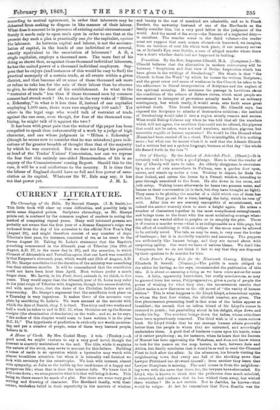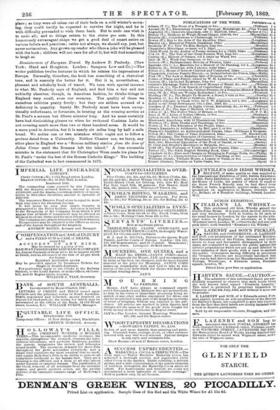CURRENT LITERATURE.
The Chronology of the Bible. By Samuel Sharpe. (J. R. Smith.)— 'Thu little book will clear up some difficulties, and possibly help to settle some disputed points. Scripture chronology, as Mr. Sharpe points out, is confused by the common neglect of readers in noting the method of computing regnal years. Many well informed persons are probably not aware that the first year of a Roman Emperor's reign was reckoned from the day of his accession to the official New Year's Day (August 29), and might therefore consist of any number of days. Tiberiwee first year, for instance, consisted of ten, as he came to the throne August 19. Taking St. Luke's statement that the Baptist's preaching commenced in the fifteenth year of Tiberius (the 29th of Aligns% A.D. 27, to the same day in 28), and the assertion, in which Clement of Alexandria and Tertullian agree, that our Lord was crucified in that Emperor's sixteenth year, which would end 29th of August, A.D. 29, Mr. Sharpe concludes that the duration of the ministrywas something less than nineteen months. It will be remembered that the crucifixion -could not have been later than April. Most writers prefer a much longer time. Mr. Lewin, in his Fasti Sacri, extends it, we think, to five years. They would argue that the fifteenth year of St. Luke may refer to the joint reign of Tiberius with Augustus, though this seems doubtful, and with more force, that the dates of the Christian fathers are not trustworthy. Mr. Sharpe's argument that tho crucifixion took place on a Thursday is very ingenious. It makes three of the accounts very plain by sacrificing St. Luke's. We were amused at the naivete with which the date of Daniel, chap. 7, is fixed. The sixty-and-two weeks and half a week he takes to end in B.C. 51, when Ciabinius set up the Roman 'ensigns (the abomination of desolation) on the walls ; and so, as he says, "the author of this chapter would seem to have written it in the year B.C. 51." The hypothesis of prediction is evidently not worth mentioning, and yet a number of people, some of them very learned people, believe in it.
A House of Cards. By Mrs. Cashel Hoey. 3 vols. (Tineley.)—A good novel, we might venture to say a very good novel, though the 3nterest is scarcely maintained to the end. The title, while it explains the nature of the story, may serve to account for this failure. Building a house of cards is an operation which a bystander may watch with almost breathless attention, but when it is tolerably well finished we look with certainty for the catastrophe. We look with interest, almost With sympathy, at Julia as she builds up her card-house of a happy and Prosperous life ; when that is done the interest fails. We know that it Will comedown; we even perceive what it is that will bring it down. This 'being so, there cannot be much of a plot. But there are some very good writing and drawing of character. The Havilsnd family, with their -serene, unshaken belief in their superiority in the matters of wisdom and beauty to the rest of mankind are admirable, and so Is Frank Burdett, the unworthy husband of one of the Havilande as the family consider him, but a very good fellow in the judgment of the world. And the moral of the story—the Nemesis of a neglected duty— is excellent. The murder scene in the third volume—the reader must not suppose that such scenes abound—is borrowed, we imagine, from an incident of real life which took place, if our memory serves us, at Ireland's Eye, near Dublin, a case of alleged murder where there was a doubt whether death had not happened in bathing.
Transition. By the Rev. Augustus Clissold, MA. (Lougman.)—Mr. Clissold believes that the alternative in modern controversy will be between "Scepticism and that view of Divine Inspiration which has been given in the writings of Swedenborg." His thesis is that "the Church is from the Word," by which he means the written Scripture ; and the great error and cause of weakness in the Church he takes to be the adherence to literal interpretation of Scripture and the neglect of the spiritual meaning. He instances the passage in Leviticus, alma the conditions of the release of Hebrew slaves, which most people are aocustomed to interpret of provisions actually made for an ordinary contingency, but which really, it would seem, seta forth some great spirituel truth. This literal interpretation, Mr. Clissold says, has exposed the Scripture to attacks of destructive criticism ; the method of Swedenborg would take it into a region utterly remote and secure. What could Bishop Colons° say when he was told that all the numbers which will not agree, the sacrifices that could not be offered, the pigeons that could not be eaten, were not real numbers, sacrifices, pigeons, but uncertain angelic or human mysteries? Ho would be like Dicened when Eneas had been carried off in a cloud. This is intelligible, if it is nothing more; but what can be meant when it is said that the Adamic Church had a written but not a spoken language, because at that day " the whole life flamed forth in the face "?
Out of (.."'harity. By the Author of Askerdde Park. (Skeet.)—It is certainly well to begin with a good plunge. Hero is what the reader of Out of Charity will have to take. An elderly clergyman is oyertakeu by a storm of rain somewhere in Fulham, sees a garden door open, enters, and stands up under a tree. Wishing to depart, he finds the door locked, and enters the house by a French window, intending to pass through unnoticed to the front. He sits down in the room, and falls asleep. Waking hours afterwards he hears two persons enter, and listens to their conversation (it is dark, but they have brought no light). They seem to be plotting the murder of a child which one of them has with her. They go out for a time, leaving the baby, which he runs of with. After this we are scarcely susceptible of astonishment, and indeed the author scarcely rises to such a height again. Ho mixes a number of characters together in the most complicated entanglement, and brings them to the front with the most unfalteriag courage whenever they are wanted either to perplex or to simplify the plot. There is of course a murder seeno—that is as indispensable as a title-page, but the effect of combining it with an eclipse of the moon must be allowed to be entirely noveL The tale, as may be aeon, is very near the border of burlesque ; but it is decidedly readable and amusing. The puppets are sufficiently like human beings, and they are moved about with surprising agility. One word we have of serious blame. We don't like Orangemen, but we do not think it fair to say that they are disposed by their opinions to do murder for hire.
Uncle Peter's Fairy Tale for the Nineteenth Century. Edited by Elizabeth M. Sowell. (Nimmo.)—The public is much obliged to the editor for having, as she says, recommended the publication of this tale. It is about as amusing a thing as we have come across for some time. A fairy, apparently benevolent, but really mischievous, as may be guessed from her name, Polypragatosyne, gives a party of people the power of wishing for what they like ; the inconvenient results that follow make a new discourse on the old moral of "the vanity of human wishes." This is what happens to Sir Lloyd Lloyd, a benevolent squire, to whom the first four wishes, the allotted number, arc given. The first phenomenon presenting itself is that none of the ladies appear at breakfast; the second, that an infirm friend of Sir Lloyd's comes in restored to youth ; but gambolling about in his delight, slips down sad breaks his leg. Tho accident brings down the ladies, whose crinolines have been mysteriously removed. The third wish is of a more serious kind. Sir Lloyd thinks that he can manage human affairs generally better than the people to whom they are entrusted, and accordingly undertakes them. A good deal of business comes upon his hands, some of it rather perplexing ; as, for instance, when he hears that the Imam of Muscat has been oppressing the Wahabees, and does, not know where to look for the names on the map, hovers, in fact, between Asia and Africa, but finally concludes that it would be as well to send the Channel Fleet to look after the affair. In the afternoon, his friends visiting the neighbouring town find every one full of the shocking news that Lawyer Pritchard has drowned himself ; from another they learn that Lawyer Sharphaur is missing. The mail comes in from the neighbouring town with the news that there, too, the lawyers have absconded. Sir Lloyd, who is known to think that the profession does much mischief, is suspected, and confesses that he has wished them away, but wished them whither ? He is not certain. Nut to Jericho, he knows—that would be vulgar. At last ho remembers that Nova Zombia was the
pieceas they were all taken out of their beds on a cold winter's morning, they could hardly be expected to survive the nigh; and he is with difficulty persuaded to wish them back. But to undo one wish is to undo all ; and so things return to the status quo ante. In this humorously extravagant shape we get a good deal of smart 'satire on -various beliefs and practice.; satire not always, we should say, just, but never acrimonious. Any grown-up reader who likes a joke will be pleased with the book ; children will not care for all of it, but will find something to laugh at.
.Reminiscences of European Travel. By Andrew P. Peabody. (New York: Hurd and Houghton. London : Sampson Low and Co.)—The writer publishes twelve lectures in which he relates his impressions of Europe. Naturally, therefore, the book has something of a rhetorical tone, and is scarcely tho better for it. But it is, nevertheless, a pleasant and scholarly book of travel. We turn with special interest to what Mr. Peabody says of England, and find him a fair and not unkindly observer, though, in American fashion, he thinks things in England very small, even our sermons. The quality of these we ourselves criticize pretty freely ; but they are seldom accused of a deficiency in quantity. Surely Mr. Peabody must have boon exceptionally unfortunate, or fortunate, in hearing at the evening service at St. Paul's a sermon but fifteen minutes' long. And he must certainly have had diminishing glasses on when ho reckoned Coniston Lake as not covering much more than two or three hundred acres. It would be a mere pond in America, but it is nearly six miles long by half a mile broad. We notice one or two mistakes which ought not to follow a preface dated from a University. Neither Chester nor, we fancy, any other place in England was a "Roman military station from the time of Julius Ccesar until the Romans left the island." A less excusable mistake is the statement that Sir Christopher Wren made his plans for St. Pant's "under the last of the Roman Catholic Kings." The building of the Cathedral was in fact commenced in 1675.



































 Previous page
Previous page